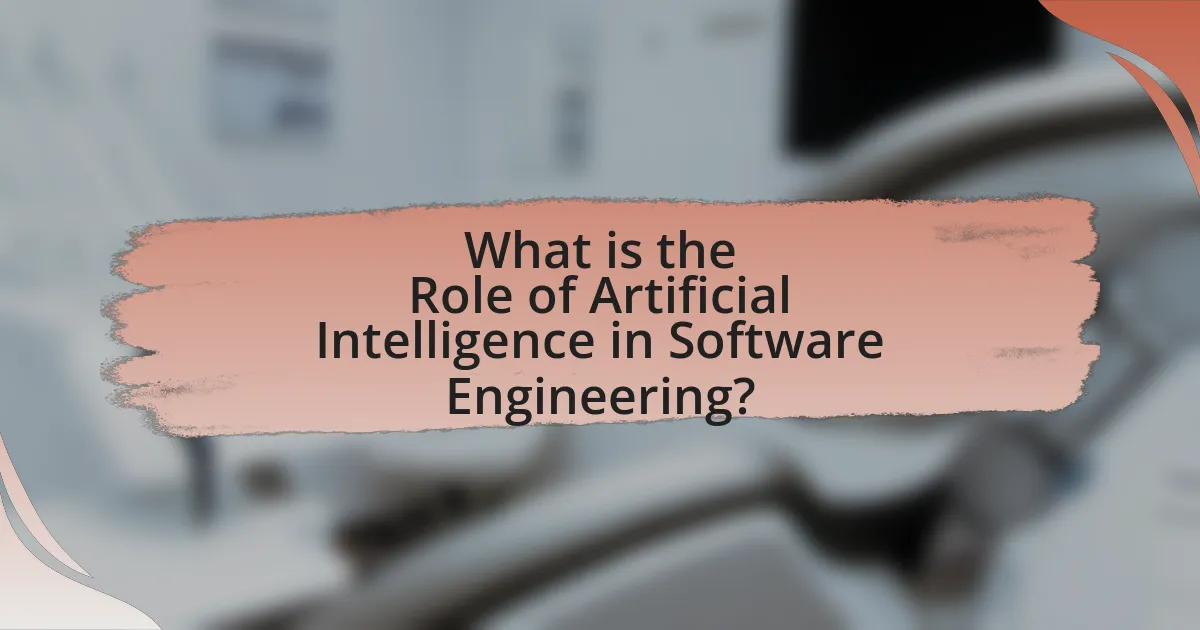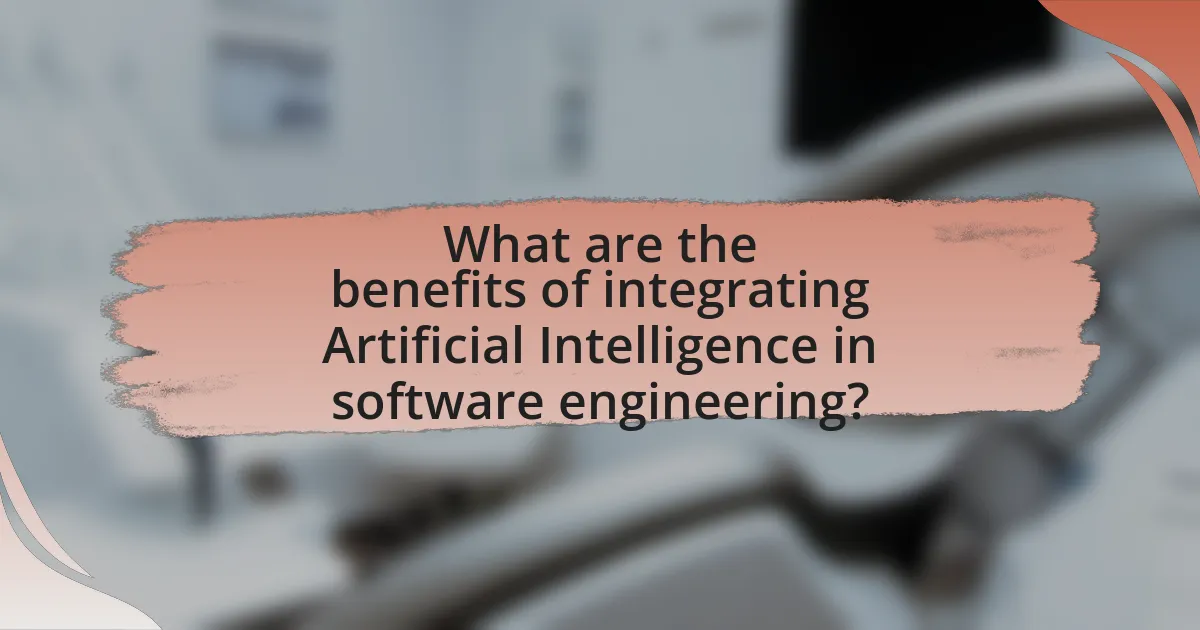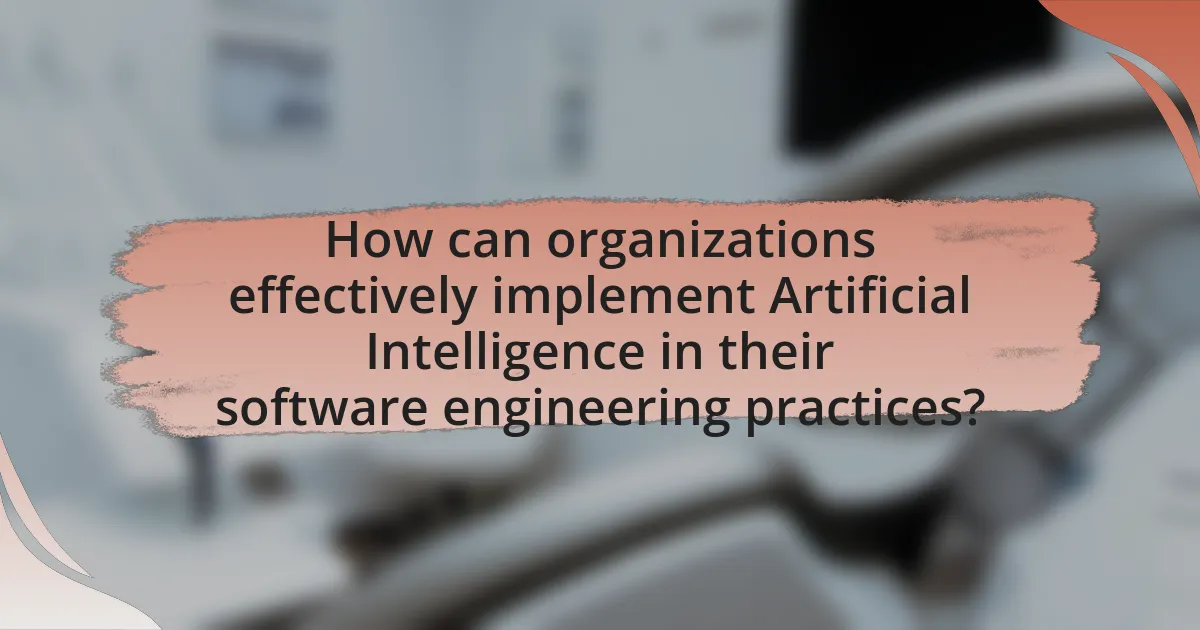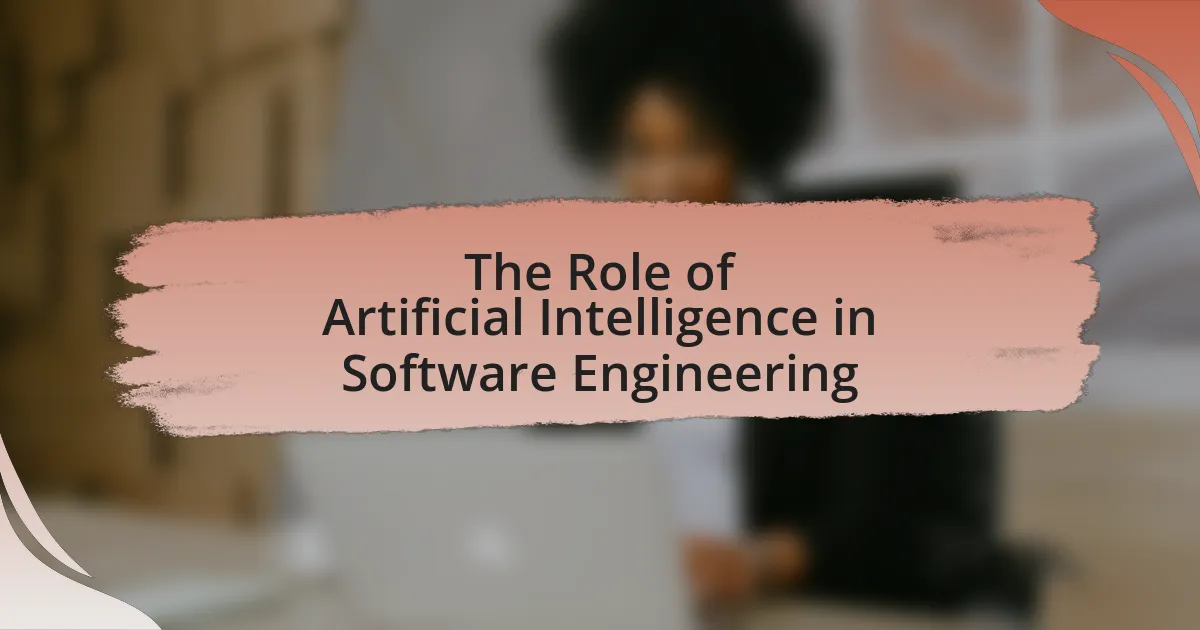Artificial Intelligence (AI) is increasingly integral to software engineering, enhancing productivity, code quality, and project management efficiency. AI technologies, including machine learning and natural language processing, automate repetitive tasks, improve decision-making, and facilitate faster development cycles. The article explores specific applications of AI in software engineering, such as code generation, bug detection, and project management optimization, while also addressing challenges like bias and security concerns. Additionally, it highlights the importance of training and best practices for effective AI integration in software development processes.

What is the Role of Artificial Intelligence in Software Engineering?
Artificial Intelligence plays a crucial role in software engineering by enhancing various stages of the software development lifecycle. AI technologies, such as machine learning and natural language processing, automate repetitive tasks, improve code quality through predictive analytics, and facilitate better decision-making in project management. For instance, AI-driven tools can analyze vast amounts of code to identify bugs and suggest fixes, significantly reducing debugging time. According to a report by McKinsey, companies that implement AI in their software development processes can increase productivity by up to 40%. This demonstrates that AI not only streamlines workflows but also contributes to higher efficiency and effectiveness in software engineering practices.
How does Artificial Intelligence enhance software development processes?
Artificial Intelligence enhances software development processes by automating repetitive tasks, improving code quality, and accelerating project timelines. AI tools can analyze vast amounts of data to identify patterns, enabling developers to make informed decisions quickly. For instance, AI-driven code review systems can detect bugs and suggest improvements, which reduces the time spent on manual testing. According to a study by McKinsey, AI can increase productivity in software development by up to 40% by streamlining workflows and minimizing human error. This integration of AI not only boosts efficiency but also allows developers to focus on more complex and creative aspects of software engineering.
What specific tasks can AI automate in software engineering?
AI can automate several specific tasks in software engineering, including code generation, bug detection, testing, and project management. For instance, AI-driven tools like GitHub Copilot can generate code snippets based on natural language descriptions, significantly speeding up the coding process. Additionally, AI algorithms can analyze codebases to identify bugs and vulnerabilities, enhancing software quality. Automated testing frameworks powered by AI can execute test cases and analyze results, reducing manual testing efforts. Furthermore, AI can optimize project management by predicting project timelines and resource allocation based on historical data, improving overall efficiency. These capabilities demonstrate AI’s transformative impact on software engineering processes.
How does AI improve code quality and reliability?
AI improves code quality and reliability by automating code reviews, detecting bugs, and suggesting optimizations. Automated code review tools powered by AI can analyze code for adherence to best practices and coding standards, significantly reducing human error. For instance, tools like DeepCode and SonarQube utilize machine learning algorithms to identify vulnerabilities and code smells, which enhances overall code quality. Additionally, AI-driven testing frameworks can simulate various scenarios to uncover hidden bugs, leading to more robust software. Research indicates that companies employing AI in their development processes report up to a 30% reduction in bugs and a 50% increase in code maintainability, demonstrating the tangible benefits of AI in improving software reliability.
Why is Artificial Intelligence becoming essential in software engineering?
Artificial Intelligence is becoming essential in software engineering due to its ability to enhance productivity, improve code quality, and automate repetitive tasks. AI tools can analyze vast amounts of data to identify patterns, enabling developers to make informed decisions and optimize their workflows. For instance, AI-driven code review systems can detect bugs and suggest improvements, significantly reducing the time spent on manual testing. According to a report by McKinsey, organizations that implement AI in their software development processes can increase productivity by up to 40%. This integration not only accelerates development cycles but also leads to more reliable software products, making AI a critical component in modern software engineering practices.
What challenges in software engineering does AI address?
AI addresses several challenges in software engineering, including code quality, bug detection, and project management. By utilizing machine learning algorithms, AI can analyze vast amounts of code to identify patterns and potential errors, significantly improving code quality. For instance, tools like DeepCode and SonarQube leverage AI to detect bugs and vulnerabilities in real-time, reducing the time developers spend on manual code reviews. Additionally, AI enhances project management by predicting project timelines and resource allocation through data analysis, which helps in optimizing workflows and improving team productivity. These capabilities demonstrate AI’s effectiveness in tackling common software engineering challenges.
How does AI contribute to faster development cycles?
AI contributes to faster development cycles by automating repetitive tasks and enhancing decision-making processes. Automation of coding, testing, and deployment reduces the time developers spend on manual tasks, allowing them to focus on more complex problem-solving. For instance, AI-driven tools can generate code snippets or identify bugs in real-time, significantly speeding up the debugging process. According to a study by McKinsey, organizations that implement AI in their software development processes can reduce development time by up to 30%. This efficiency not only accelerates project timelines but also improves overall software quality, as AI can analyze vast amounts of data to provide insights that inform better design and architecture decisions.
What are the key technologies driving AI in software engineering?
Key technologies driving AI in software engineering include machine learning, natural language processing, and automated reasoning. Machine learning algorithms enable systems to learn from data and improve over time, which is essential for tasks such as code analysis and bug detection. Natural language processing facilitates better communication between developers and AI tools, allowing for more intuitive code generation and documentation. Automated reasoning technologies assist in verifying software correctness and optimizing performance by applying logical reasoning to software specifications. These technologies collectively enhance productivity, improve software quality, and streamline development processes in the field of software engineering.
What role do machine learning and deep learning play?
Machine learning and deep learning play crucial roles in enhancing software engineering by automating tasks, improving decision-making, and enabling predictive analytics. These technologies allow software systems to learn from data, adapt to new inputs, and optimize performance without explicit programming. For instance, machine learning algorithms can analyze large datasets to identify patterns and make recommendations, while deep learning models, which are a subset of machine learning, excel in processing unstructured data such as images and natural language. The integration of these technologies in software engineering leads to increased efficiency, reduced development time, and the ability to create more intelligent applications, as evidenced by their widespread use in areas like automated testing, code generation, and user experience personalization.
How do natural language processing and computer vision integrate with software engineering?
Natural language processing (NLP) and computer vision integrate with software engineering by enhancing the capabilities of applications through the analysis and interpretation of human language and visual data. NLP enables software to understand and generate human language, facilitating user interactions and automating tasks such as customer support and content generation. Computer vision allows software to interpret and analyze visual information, enabling functionalities like image recognition, object detection, and video analysis. Together, these technologies improve user experience and operational efficiency in software applications, as evidenced by their use in systems like chatbots and autonomous vehicles, which rely on both language understanding and visual perception to function effectively.

What are the benefits of integrating Artificial Intelligence in software engineering?
Integrating Artificial Intelligence in software engineering enhances efficiency, accuracy, and innovation. AI automates repetitive tasks, such as code generation and testing, which significantly reduces development time. For instance, tools like GitHub Copilot utilize machine learning to assist developers in writing code faster and with fewer errors. Additionally, AI-driven analytics can predict project risks and optimize resource allocation, leading to better project management. According to a report by McKinsey, companies that adopt AI in their software processes can improve productivity by up to 40%. This integration not only streamlines workflows but also fosters the creation of smarter applications that can adapt to user needs in real-time.
How does AI improve decision-making in software projects?
AI improves decision-making in software projects by analyzing vast amounts of data to provide insights that inform project planning and execution. For instance, AI algorithms can evaluate historical project data to identify patterns and predict potential risks, enabling teams to make informed choices about resource allocation and timelines. According to a study by McKinsey, organizations that leverage AI in project management can reduce project overruns by up to 20%. This data-driven approach enhances accuracy in forecasting and helps teams prioritize tasks effectively, ultimately leading to more successful project outcomes.
What metrics can be enhanced through AI-driven insights?
AI-driven insights can enhance metrics such as code quality, defect density, and development velocity. By analyzing historical data and patterns, AI can identify areas for improvement in code quality, leading to a reduction in defect density, which is the number of defects per unit of code. Additionally, AI can optimize development velocity by predicting project timelines and resource allocation, thereby improving overall productivity. Studies have shown that organizations leveraging AI for software metrics experience up to a 30% increase in efficiency and a significant decrease in post-release defects, validating the effectiveness of AI in enhancing these critical software engineering metrics.
How does AI facilitate better project management?
AI facilitates better project management by automating routine tasks, enhancing decision-making, and improving resource allocation. Automation of tasks such as scheduling, reporting, and tracking progress reduces manual effort and minimizes human error, allowing project managers to focus on strategic activities. Enhanced decision-making is achieved through data analysis and predictive analytics, which provide insights into project risks and timelines, enabling proactive adjustments. Improved resource allocation is facilitated by AI’s ability to analyze team performance and workload, ensuring that resources are utilized efficiently. According to a report by McKinsey, organizations that implement AI in project management can increase productivity by up to 40%, demonstrating the significant impact of AI on project efficiency and effectiveness.
What impact does AI have on team collaboration in software engineering?
AI enhances team collaboration in software engineering by facilitating communication, automating repetitive tasks, and providing data-driven insights. Tools powered by AI, such as chatbots and project management software, streamline interactions among team members, reducing misunderstandings and improving response times. Additionally, AI algorithms can analyze code and suggest improvements, allowing teams to focus on more complex problem-solving rather than mundane tasks. Research indicates that teams utilizing AI tools report a 30% increase in productivity and a 25% reduction in project completion time, demonstrating the tangible benefits of AI in collaborative environments.
How does AI support remote and distributed teams?
AI supports remote and distributed teams by enhancing communication, automating tasks, and providing data-driven insights. For instance, AI-powered collaboration tools like Slack and Microsoft Teams facilitate real-time communication and project management, ensuring team members stay connected regardless of location. Additionally, AI can automate repetitive tasks, such as scheduling meetings or managing workflows, which increases efficiency and allows team members to focus on more strategic activities. According to a report by McKinsey, organizations that implement AI in their operations can improve productivity by up to 40%, demonstrating the significant impact AI has on optimizing team performance in remote settings.
What tools leverage AI for enhanced team communication?
Tools that leverage AI for enhanced team communication include Slack, Microsoft Teams, and Zoom. These platforms utilize AI features such as natural language processing for smart replies, sentiment analysis to gauge team morale, and automated scheduling to streamline meetings. For instance, Slack’s AI-driven features help prioritize messages and suggest relevant channels, improving communication efficiency. Microsoft Teams employs AI to transcribe meetings and provide real-time translation, facilitating better collaboration among diverse teams. Zoom integrates AI for virtual backgrounds and noise cancellation, enhancing the clarity of communication during video calls. These functionalities demonstrate how AI tools can significantly improve team communication dynamics in software engineering environments.
What are the potential risks of using Artificial Intelligence in software engineering?
The potential risks of using Artificial Intelligence in software engineering include bias in decision-making, security vulnerabilities, and lack of transparency. Bias can occur when AI systems are trained on unrepresentative data, leading to unfair outcomes in software applications. Security vulnerabilities arise as AI systems may be exploited by malicious actors, increasing the risk of data breaches or system failures. Additionally, the lack of transparency in AI algorithms can make it difficult for engineers to understand how decisions are made, complicating debugging and accountability. These risks highlight the need for careful implementation and oversight of AI technologies in software engineering.
How can bias in AI algorithms affect software outcomes?
Bias in AI algorithms can lead to skewed software outcomes by perpetuating stereotypes and reinforcing inequalities. For instance, biased training data can result in algorithms that favor certain demographics over others, leading to unfair treatment in applications like hiring tools or loan approvals. A study by ProPublica found that a risk assessment algorithm used in the criminal justice system was biased against African American defendants, falsely flagging them as higher risk compared to white defendants. This demonstrates how bias can not only affect individual decisions but also contribute to systemic issues within software applications.
What security concerns arise from AI integration?
AI integration raises several security concerns, including data privacy, algorithmic bias, and adversarial attacks. Data privacy issues arise when AI systems process sensitive information, potentially leading to unauthorized access or data breaches. For instance, a study by the Ponemon Institute found that 60% of organizations experienced a data breach due to inadequate security measures in AI systems. Algorithmic bias can result in unfair treatment of individuals based on flawed training data, which can have serious implications in areas like hiring or law enforcement. Additionally, adversarial attacks exploit vulnerabilities in AI models, allowing malicious actors to manipulate outcomes, as demonstrated in research by Szegedy et al. (2014), which showed how small perturbations in input data could drastically alter AI predictions. These concerns highlight the need for robust security frameworks in AI development and deployment.

How can organizations effectively implement Artificial Intelligence in their software engineering practices?
Organizations can effectively implement Artificial Intelligence in their software engineering practices by integrating AI tools into their development workflows, enhancing automation, and leveraging data analytics for decision-making. For instance, using AI-driven code review tools can significantly reduce errors and improve code quality, as evidenced by studies showing a 30% reduction in bugs when AI tools are utilized. Additionally, organizations should invest in training their engineering teams on AI technologies to ensure they can effectively utilize these tools, which has been shown to increase productivity by up to 25%. Furthermore, adopting agile methodologies that incorporate AI can streamline project management and enhance collaboration, leading to faster delivery times and improved project outcomes.
What best practices should be followed for AI integration?
Best practices for AI integration include establishing clear objectives, ensuring data quality, fostering collaboration between teams, and implementing iterative development processes. Clear objectives guide the AI project, ensuring alignment with business goals. High-quality data is crucial, as AI models rely on accurate and relevant information for effective learning and performance. Collaboration between data scientists, software engineers, and domain experts enhances the integration process by combining diverse expertise. Iterative development allows for continuous improvement and adaptation based on feedback, which is essential in the dynamic field of AI. These practices are supported by industry standards and successful case studies, demonstrating their effectiveness in achieving successful AI integration in software engineering.
How can teams ensure data quality for AI applications?
Teams can ensure data quality for AI applications by implementing rigorous data validation processes and continuous monitoring. Establishing clear data governance policies helps define data standards and responsibilities, ensuring that data is accurate, complete, and consistent. Regular audits and automated data quality checks can identify anomalies and errors, allowing teams to address issues proactively. Research indicates that organizations with strong data quality management practices experience up to 30% higher operational efficiency, demonstrating the importance of maintaining high data quality for effective AI outcomes.
What training is necessary for software engineers to work with AI?
Software engineers need a combination of formal education, specialized training, and practical experience to work with AI effectively. A bachelor’s degree in computer science, software engineering, or a related field provides foundational knowledge. Additionally, training in machine learning, data science, and AI frameworks such as TensorFlow or PyTorch is essential.
Courses in statistics, linear algebra, and programming languages like Python are also critical, as they equip engineers with the necessary skills to develop and implement AI algorithms. Practical experience through projects, internships, or contributions to open-source AI initiatives further enhances their capabilities. According to a report by the World Economic Forum, 85 million jobs may be displaced by AI by 2025, emphasizing the need for engineers to adapt and acquire these skills to remain relevant in the evolving job market.
What tools and frameworks are available for AI in software engineering?
Numerous tools and frameworks are available for AI in software engineering, including TensorFlow, PyTorch, Keras, and Scikit-learn. TensorFlow, developed by Google, is widely used for machine learning and deep learning applications, providing a flexible ecosystem for building and deploying AI models. PyTorch, favored for its dynamic computation graph, is popular in research and production for tasks like natural language processing and computer vision. Keras, which runs on top of TensorFlow, simplifies the process of building neural networks, making it accessible for developers. Scikit-learn is a robust library for traditional machine learning algorithms, offering tools for data preprocessing, model selection, and evaluation. These frameworks are supported by extensive documentation and community contributions, validating their effectiveness in AI-driven software engineering projects.
Which platforms are most popular for AI development?
The most popular platforms for AI development are TensorFlow, PyTorch, and Keras. TensorFlow, developed by Google, is widely used for its flexibility and scalability in building machine learning models. PyTorch, created by Facebook, is favored for its dynamic computation graph and ease of use, particularly in research settings. Keras, which runs on top of TensorFlow, simplifies the process of building neural networks with its user-friendly API. These platforms dominate the AI landscape due to their robust community support, extensive libraries, and comprehensive documentation, making them essential tools for developers in the field of artificial intelligence.
How do these tools facilitate the software engineering process?
Artificial intelligence tools facilitate the software engineering process by automating repetitive tasks, enhancing code quality, and improving project management efficiency. These tools, such as code analyzers and automated testing frameworks, reduce human error and increase productivity by allowing engineers to focus on more complex problem-solving. For instance, AI-driven code review tools can identify bugs and suggest improvements in real-time, leading to faster development cycles and higher-quality software. Additionally, project management tools powered by AI can predict project timelines and resource needs based on historical data, optimizing team performance and resource allocation.
What are the future trends of Artificial Intelligence in software engineering?
The future trends of Artificial Intelligence in software engineering include increased automation of coding tasks, enhanced software testing through AI-driven tools, and the integration of machine learning for predictive analytics in project management. Automation of coding tasks is expected to streamline development processes, as tools like GitHub Copilot already assist developers by suggesting code snippets based on context. AI-driven testing tools, such as Test.ai, are improving software quality by automating test case generation and execution, significantly reducing time and effort. Additionally, machine learning algorithms are being utilized for predictive analytics, enabling teams to forecast project timelines and resource needs more accurately, as evidenced by studies showing a 30% improvement in project delivery times when using AI analytics.
How will AI shape the future of software development methodologies?
AI will significantly shape the future of software development methodologies by automating repetitive tasks, enhancing decision-making processes, and enabling more adaptive and agile practices. Automation through AI tools can streamline coding, testing, and deployment, reducing the time and effort required for these tasks. For instance, AI-driven code generation tools can produce boilerplate code, allowing developers to focus on more complex problems. Additionally, AI can analyze vast amounts of data to provide insights that inform project management and resource allocation, leading to more efficient workflows. Research from McKinsey indicates that organizations leveraging AI in software development can improve productivity by up to 40%. Furthermore, AI’s ability to learn from past projects can facilitate continuous improvement in methodologies, making them more responsive to changing requirements and user feedback.
What emerging technologies could influence AI in software engineering?
Emerging technologies such as quantum computing, edge computing, and blockchain could significantly influence AI in software engineering. Quantum computing enhances AI capabilities by enabling faster data processing and complex problem-solving, which can lead to more efficient algorithms and models. Edge computing allows AI to process data closer to the source, reducing latency and improving real-time decision-making in software applications. Blockchain technology can enhance AI by providing secure and transparent data management, which is crucial for training AI models with integrity. These technologies collectively contribute to the evolution of AI, making software engineering more robust and efficient.
What practical tips can help teams leverage AI in software engineering?
To effectively leverage AI in software engineering, teams should integrate AI tools into their development workflows. This can be achieved by adopting AI-driven code review tools, which enhance code quality by identifying potential bugs and suggesting improvements. For instance, tools like DeepCode and Codacy utilize machine learning to analyze codebases and provide actionable feedback, resulting in reduced error rates and improved maintainability. Additionally, teams should invest in training their members on AI technologies to foster a culture of innovation and ensure that all team members can effectively utilize AI capabilities. Research indicates that organizations that prioritize AI training see a 20% increase in productivity, demonstrating the tangible benefits of such investments.

Leave a Reply